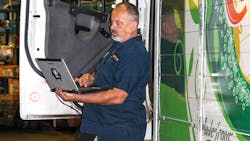Vehicle maintenance reporting standards (VMRS), the coding convention used by fleets to track and analyze equipment and maintenance costs, was developed in 1970 by the American Trucking Association’s Technology and Maintenance Council (TMC). TMC still manages VMRS today and keeps the standard up to date by overseeing the addition of codes for the latest equipment and technologies operated by fleets.
Jack Poster, VMRS services manager at TMC, and Joe Farke, supervisor, mechanical engineer at Altec Industries, spoke about how VMRS is kept up to date during a study session at TMC’s virtual spring meeting.
Poster noted that VMRS is an integral part of most major fleet maintenance software, meaning most fleet maintenance managers and technicians have at least some knowledge of the coding system. For those not intimately familiar, however, Poster broke it down into four basic categories:
- Equipment classification codes.
- Labor codes. “This is a big part of VMRS,” Poster said. “There are codes for failure, work accomplished, reason for repair…”
- Component codes. “When everyone thinks of VMRS they think of the part description codes, the component codes, the nine-digit number,” he said.
- Manufacturer, supplier, brand code. “There are a little more than 11,000 manufacturers listed,” Poster noted.
He went on to explain that VMRS never ends; it is a living system that is constantly being added to and updated.
“We are always adding new codes; either filling in codes that were never put in in the past or adding new codes as new technology comes into play – like electric vehicle codes,” Poster explained. “On a regular basis we are adding new codes, we’re trying to reflect what is going on out in the real world, and what you as the user need. I always stress that if I don’t hear from you, the user, I have to make the assumption that everything is fine. So, I encourage you to get [in touch with] me.”
Altec is one of several companies that works with TMC to keep VMRS up to date. The company designs, manufactures, and services fleets of hydraulic mobile, mounted equipment primarily serving the utility, construction, telecom, and forestry groups. Farke serves as a sort of VMRS liaison, working with Poster and others at TMC to help create new codes for the equipment Altec makes and services.
“We’re very similar to standard lift equipment, but there’s some additional regulations and guidance along with that,” Farke said. “Where VMRS came into play is that Altec began to look at how we can serve our customers better from a service aspect. We were getting direct requests from customers for these codes.”
This was the first that Farke learned of VMRS, so he did some research and learned how Altec could get involved and submit codes for products that were not yet accounted for in VMRS. Being new to the submission process, Farke noted that there was a significant learning curve before he was successful in submitting codes.
“Our first attempt was to give some really ultra-specific codes to try to classify every option, every possible configuration of our equipment,” Farke said.
It took some time to realize that “a door is a door regardless of what type of vehicle it’s on.” A VIN, part number, or other supplemental information can provide additional detail if needed.
VMRS best practices
Now about a year-and-a-half into working with TMC to create new VMRS codes, Farke has the process down to a science. The first step is to break the parts down into groups.
“Look at the categories,” he said. “How would you disassemble your equipment? What would it look like if you laid all the pieces on the floor; could you put them into piles or buckets? … Think about, from an intuitive level from your technicians where you would put those components. Also, get their feedback. If you’ve got access to any technician groups or other user bases, that was really a great content check for us.”
It is important, however, not to take coding too far, Farke noted.
“Creating codes just to create codes doesn’t necessarily benefit anyone,” he said. “The codes need to be sought after by technicians. They can always be added later if you don’t have them. This is a living process; you won’t get everything on the first pass.”
If a part will typically be replaced as part of a bigger assembly, it’s not necessary to break the code all the way down to the nuts, bolts, and washers, Farke described as an example. It is important to look at what technicians are going to be doing and what the manufacturer is going to recommend for a routine maintenance procedure.
To truly understand VMRS and be successful at creating new codes, you need to “immerse yourself in the process,” Farke said. Do your homework, ask questions, don’t overthink it, and keep it simple.
“Get involved with TMC,” Farke advised. “Learning the process, the code submission templates, the nomenclature of VMRS was important. I started off by becoming VMRS certified and learning the codes, the structure, the intent of that from a core standpoint. That was very educational and helpful, and that paved the foundation for how we go about creating codes for the future.”
For more information on VMRS or to request a new VMRS code, visit TMC.Trucking.org/VMRS-Overview or contact Jack Poster at [email protected].
About the Author
David Brierley
Editor | Fleet Maintenance
David Brierley is a former editor of Fleet Maintenance magazine.
Brierley’s education and career have been based in the publishing industry. He is an award-winning writer and comes from a background in automotive, trucking, and heavy equipment. Brierley joined the Endeavor Business Media vehicle repair group in 2017 as managing editor for Fleet Maintenance, PTEN, and Professional Distributor magazines, as well as VehicleServicePros.com. In his current role, he writes for and oversees production of Fleet Maintenance magazine. He has worked in the publishing industry since 2011.

